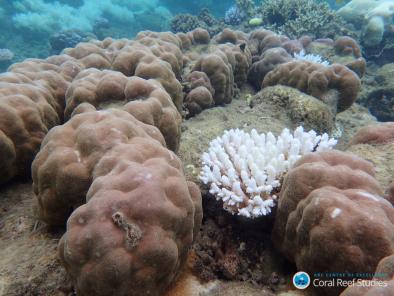Science Source
Divergence of seafloor elevation and sea level rise in coral reef ecosystems
- Provides a comprehensive assessment of the combined effect of all of the processes affecting seafloor accretion and erosion by measuring changes in seafloor elevation and volume for five coral reef ecosystems in the Atlantic, Pacific, and Caribbean over the last several decades
- Observes regional-scale mean elevation and volume losses at all five study sites and in 77 % of the 60 individual habitats examined across all study sites
- Finds that mean seafloor elevation losses for whole coral reef ecosystems ranged from −0.09 to −0.8 m, corresponding to net volume losses ranging from 3.4 × 106 to 80.5 × 106 m3 for all study sites
- Finds that erosion of both coral-dominated substrate and non-coral substrate suggests that the current rate of carbonate production is no longer sufficient to support net accretion of coral reefs or adjacent habitats
- Shows that regional-scale loss of seafloor elevation and volume has accelerated the rate of relative sea level rise in these regions
- Finds that current water depths have increased to levels not predicted until near the year 2100, placing these ecosystems and nearby communities at elevated and accelerating risk to coastal hazards
- Results set a new baseline for projecting future impacts to coastal communities resulting from degradation of coral reef systems and associated losses of natural and socioeconomic resources
Related Content
Headline

Apr 18, 2018 | Washington Post
Global warming has changed the Great Barrier Reef ‘forever,’ scientists say
Science Source
| World Weather Attribution
Great Barrier Reef Bleaching, March 2016
Science Source
| Proceedings of the National Academy of Sciences
Ocean acidification affects coral growth by reducing skeletal density
Nathaniel R. Mollica, Weifu Guo, Anne L. Cohen et al
Science Source
| PLOS ONE
Coral physiology and microbiome dynamics under combined warming and ocean acidification
Andréa G. Grottoli, Paula Dalcin Martins, Michael J. Wilkins et al


